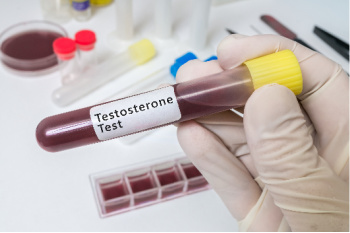Health Risks Different for Men and Women with Genetically High Testosterone

Genetically high levels of testosterone pose different health risks for men and women, especially for diabetes, according to a February 2020 study in the journal Nature Medicine.
Having these high testosterone levels increases a woman’s risk for type 2 diabetes by 37%, the scientists reported. But in men, high testosterone lowers diabetes risk by 14%.
Both men’s and women’s bodies produce testosterone. However, this sex hormone is usually associated with men because their bodies make more of it. Testosterone is responsible for many masculine characteristics, like facial hair, a deep voice, and muscle mass. It’s also important for sexual function.
The researchers analyzed genetic data from over 425,000 people in the United Kingdom. They identified over 2,500 genetic variations related to testosterone.
“We’ve shown that testosterone levels in men and women are heritable [transmissible from parent to child] and influenced by the combined effect of many genetic variants and genes,” study co-author Anna Murray, PhD of the University of Exeter told EncocrineWeb.com.
“Notably, testosterone levels are regulated completely differently in each of the sexes,” she added.
Genetically high testosterone levels were associated with other health risks, too.
Women with high testosterone had an increased risk of 51% for polycystic ovary syndrome (PCOS), the researchers said. PCOS affects a woman’s ovulation and menstrual cycles. It’s a common cause of female infertility.
High testosterone levels were also associated with greater risk for breast cancer and endometrial cancer.
In men, genetically high testosterone levels were linked to increased prostate cancer risk.
The findings may help healthcare providers better understand how genetics, testosterone, and certain diseases are linked. However, more research is necessary.
“We don’t recommend that anyone take medications to alter testosterone levels on the basis of our findings,” Dr. Murray told EndocrineWeb.com.
Resources
Diabetes Times
“Female high testosterone levels linked to type 2 diabetes risk”
(February 12, 2020)
https://diabetestimes.co.uk/female-high-testosterone-levels-linked-to-type-2-diabetes-risk/
EndocrineWeb.com
Doheny, Kathleen with Anna Murray, PhD, and Mark E. Molitch, MD
“High Levels of Testosterone Affect Women and Men Differently”
(February 24, 2020)
https://www.endocrineweb.com/news/other-endocrine-disorders/62835-high-levels-testosterone-affect-women-men-differently
International Society for Sexual Medicine
“What is polycystic ovary syndrome (PCOS)?”
https://www.issm.info/sexual-health-qa/polycystic-ovary-syndrome/
Nature Medicine
Ruth, Katherine S., et al.
“Using human genetics to understand the disease impacts of testosterone in men and women”
(Abstract. Published: February 10, 2020)
https://www.nature.com/articles/s41591-020-0751-5
Reuters
“Testosterone study finds differing disease links in men and women”
(February 10, 2020)
https://www.reuters.com/article/us-health-testosterone/testosterone-study-finds-differing-disease-links-in-men-and-women-idUSKBN2041VZ
University of Exeter
“Testosterone levels affect risk of metabolic disease and cancers”
(February 10, 2020)
You may also be interested in...
Other Popular Articles

What Is the Average Penis Size?
If you have ever wondered how your penis compares to others in terms of size, you are not alone. Many men are curious to know how their penises stack up compared to the average. Unfortunately, general curiosity can sometimes give way to full-on obsession and anxiety about penis size. This can be an unhealthy and often unnecessary fixation, especially because most men who think their penises are too small have perfectly normal-sized penises.

What Is Jelqing, and Does It Actually Work?
The term “jelqing” refers to a set of penis stretching exercises that some believe can make the penis bigger. Although the practice has gained attention and popularity in blogs and internet forums in recent years, there is no scientific evidence that it is an effective way to permanently increase the size of one’s penis. In fact, in some cases, jelqing may actually cause damage to the penis, so it is a good idea to get all the facts before setting off to try it.

What Is Sensate Focus and How Does It Work?
Sensate focus is a technique used to improve intimacy and communication between partners around sex, reduce sexual performance anxiety, and shift away from ingrained, goal-oriented sexual patterns that may not be serving a couple.

Can Sex Reduce Menstrual Cramps?
The SMSNA periodically receives and publishes ‘guest editorials.’ The current article was submitted by Mia Barnes, a freelance writer and researcher who specializes in women's health, wellness, and healthy living. She is the Founder and Editor-in-Chief of Body+Mind Magazine.
Having sex while you experience menstrual cramps is healthy and can provide significant benefits. While it might not be the first activity that comes to mind when your PMS or period cramping begins, many people enjoy sex to reduce menstrual cramps, experience increased pleasure and benefit from other advantages. Learn more about having sex while menstrual cramps are happening and how it can help your body.

How Long Does It Take the Average Man to Ejaculate?
On average, it takes a man between 5 to 7 minutes to orgasm and ejaculate during sexual intercourse.

Can Sex Throw off Your Vaginal pH Balance?
The SMSNA periodically receives and publishes ‘guest editorials.’ The current article was submitted by Mia Barnes, a freelance writer and researcher who specializes in women's health, wellness, and healthy living. She is the Founder and Editor-in-Chief of Body+Mind Magazine.
Your vagina is a pretty powerful organ. It is a pathway for menstrual blood and babies. It also is a main player in sexual intercourse. You might hear about your vagina’s pH and worry that yours is at risk. Here’s what to know about vaginal pH, including the impacts sex could have.
You are prohibited from using or uploading content you accessed through this website into external applications, bots, software, or websites, including those using artificial intelligence technologies and infrastructure, including deep learning, machine learning and large language models and generative AI.

